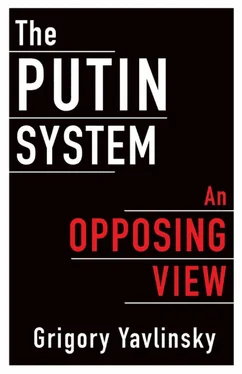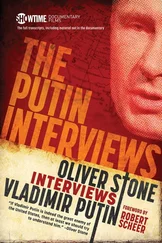Now let us digress for a moment. When discussing transition economies, proponents of the institutional approach often tend to justify corruption, at least in part, from a functional point of view—as an opportunity to reallocate resources from an old elite to the new while avoiding direct confrontation between the two. This approach portrays corruption not as a form of deviant behavior but as the divergence between earlier established norms and the current models of behavior shaped by the changes in the socioeconomic environment. According to the functionalists’ logic, corruption will die off on its own as the tension between the two normative systems becomes less acute, with the new rules supplanting the old ones and the new elite replacing their predecessors.
Whatever the case, this kind of transition did not materialize in Russia at the turn of the twenty-first century. The outcome was quite different: corruption techniques have become the foundation of economic activities. They have overpowered the functioning of both market competition and government regulation. Although some view corruption-based economic activity as a feature of the transition to a market economy, in practice it has become institutionalized for the long haul.
With private business and government having become inseparable from each other, and with conflicts of interest becoming institutionalized, pervasive, and ubiquitous, corruption has become qualitatively different from being merely a deviation from the law and the rules. It is becoming both the rule and the natural norm of behavior. Corruption has been transforming the entirety of public consciousness and has resulted in the following paradox: laws are being intentionally enacted so that they can be broken. An individual who does not partake in corruption-related activities as a matter of principle is largely and often irrevocably cut off from the means of upward mobility and is at risk of not surviving in this economy. In fact, the success of an individual member of society is evaluated by others in terms of one’s ability to break the law without getting caught, and, moreover, to maximize one’s financial gain in the process. And this is not some kind of an irrational, archaic, traditionalist rejection of formal laws. To the contrary, it is the most rational behavior in this particular context. Such a corrupt mentality cannot be rectified through education or through expanding business and human contacts with the developed world.
The supreme powers in the country are not bothered by this corruption-based system. In fact, it works to their advantage. Government compels society to be its accomplice in crime, as everyone gets involved in it, whether on a regular basis or from time to time, or abets this crime by being a passive observer. Moreover, corruption becomes the most important tool of governing this political system. Since the scale of tolerated corruption makes it virtually pervasive, the ruling circle can keep almost the entire elite in a state of uncertainty and fear—by making exceptions or qualifications, by suddenly paying attention to or, to the contrary, turning away from evidence, and by selectively turning the law enforcement machinery on or off, depending on the individuals or groups of people in question. [9] The same principle was used in Soviet central planning under Joseph Stalin: the targets set in the plans were known to be impossible to meet, yet the punishments for failing to meet them were applied selectively, depending on one’s political preferences and the currently ongoing propagandistic campaigns.
Essentially, Russia’s present-day political system is identical with corruption; its anticorruption campaigns are nothing but struggling with oneself—and the outcomes are rather predictably ineffective.
And yet, in concluding this section, let me reiterate an earlier point that some may find debatable: the scale and forms of corruption in the government and politics of today’s Russia are not an unavoidable, natural product of its authoritarian system of governance. As I mentioned at the beginning of the book, autocracies do not have to imply stagnation and the decay of their countries; both in theory and in practice, there can be authoritarian regimes geared toward modernizing their societies (even if this happens infrequently). Even though they are limited in time and have no long-term future, at a certain stage, and especially in the catching-up phase of modernization, they may be able to successfully achieve the goals of closing the gaps that separate their country from those with whom they are catching up in economic growth.
Alas, it is increasingly plain to see that today’s Russia is not an example of this. The growth of corruption is out of control. It is hard to prove with numbers but easy to experience in person, through active participation in Russia’s political and economic developments or even by carefully observing them. This is the strongest evidence that Russian authoritarianism is of a stagnation-prone, peripheral, demodernizing variety. It anchors Russia in a certain position within the world’s economic and political pecking order—a position that isn’t exactly honorable and, most importantly, holds no bright promise for Russia’s future.
THE SOCIAL BASE OF PUTIN’S POWER
Another important feature of a peripheral-type autocracy is the distinctive configuration of its social base of support. But before undertaking a description and analysis of this support, I have to make another digression. When speaking of “peripheral” authoritarianism, I am aware that, at this point in history, all countries ruled by authoritarian regimes are located, one way or another, on the periphery of global capitalism, whereas the political systems of the countries included in capitalism’s core are currently functioning on the basis of political competition. Granted, the framework of this competition may differ from one time and place to another, but in none of these countries is there a truly monopolistic grip on power by a fairly small group of people, as is typical in autocracies. Perhaps in this sense one can say that, at least at this time, there is no other type of authoritarianism than the one that exists on the periphery of the world system.
And yet I believe that identifying peripheral authoritarianism as an autonomous phenomenon is worthwhile, in terms of analyzing its characteristics in Russia. There are at least two rationales for this. First, the concept of world periphery is fairly elastic and covers economies and societies that differ widely from one another in terms of their complexity and degrees of modernization. Coincidentally, those authors who use the term “peripheral economy” in their works point to significant differences in the economies and the social structures of the countries included in this category, and they introduce the notion of “semiperipheral” countries and economies. [10] Prominent sociologist Immanuel Wallerstein (at Yale University), writing with Georgi Derluguian, describes the present-day division between the core zone of global capitalism and its periphery as akin to a solar system, in which every country is a planet orbiting around the sun—the “core” of the system—each at its own distance from it. Under certain circumstances, some of these country-planets may either move up to an orbit closer to the sun or slip into a more distant orbit. Georgi Derluguian and Immanuel Wallerstein, A Story of a Downfall: The Soviet Civilization Project in the Context of Global History , Expert 1, no. 784 (December 26, 2011) [in Russian].
Accordingly, individual countries with authoritarian or similar political systems, while being part of the overall world periphery, are positioned at considerably different places with regard to the core of the world economy. Thus, on the one hand, there are quite a few dictatorial regimes that are parasitizing on a primitive, often seminatural and monocultural economy in the countries that lag behind the leaders of modern capitalism at a distance of one or even two historical periods. On the other hand, many countries that have been in the process of making or have already completed their historic leap toward the core of industrial civilization and are positioned on its borderline continue to maintain political systems in which the principles of free political competition operate on a very limited basis, if at all. Specific examples may include Singapore, Indonesia, oil kingdoms in the Middle East, and, finally, mainland China, with its one-party system and tight control over political developments. In these countries, some form of political authoritarianism coexists with quite modern forms of entrepreneurship and with high levels of education among a significant part of society, which is also highly receptive to new technologically advanced business.
Читать дальше












